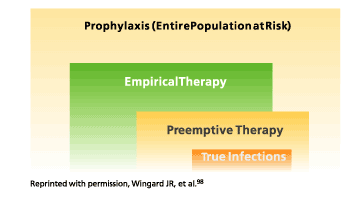The preemptive approach involves identifying patients at high risk for IFI in whom active fungal replication is taking place as an antecedent to overt invasive infection. Replication may be in the form of fungi growing on mucosal surfaces or the integument, or early tissue invasion. The approach uses early radiologic findings, mucosal surveillance cultures, and rapid detection of fungi, using assays of metabolic products, antigens, or cell-wall constituents that can be detected in blood or body fluids. Intervention with antifungal therapy while the fungal burden is low and before extensive tissue invasion occurs should optimize the chance to control infection. Moreover, patients without fungal replication would not receive antifungals needlessly, thereby sparing unnecessary toxicity, avoiding the cost of unneeded drugs, and lessening the overall risk for emergence of drug resistance in the population at large. This strategy has not been tested or validated in clinical trials. However, the introduction of new diagnostic tools will allow assessment of this promising approach.
Figure 10 demonstrates conceptually the preemptive intervention approach as compared with empiric therapy or treatment of documented infection. As shown in the figure, only a small proportion of all patients are truly infected. Those for whom preemptive therapy would be an appropriate option constitute a small proportion of all patients, none of whom are overtly infected, but a substantial proportion of whom will become infected. In contrast, a large proportion of patients currently receive empirical therapy, including some who would be candidates for preemptive therapy and others who would not. The majority of those receiving empirical therapy are never proved to have invasive infection and do not require treatment.


Course Number: V035D
This CME Expires on July 1, 2005; no tests will be accepted after this date.
This course is accredited by
The University of Pittsburgh School of Medicine, Center for Continuing Education and The International Immunocompromised Host Society
|

